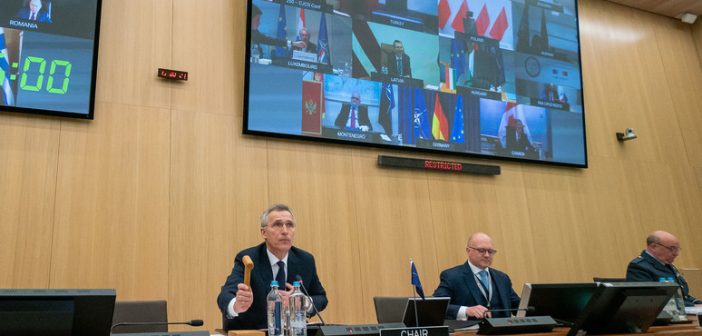By Stephen Blank, PhD
The urgent coronavirus crisis has not eclipsed pre-existing strategic conundrums like Russian threats to Europe and NATO and the urgency of adapting the alliance to meet them.
Moscow shows no sign of negotiating on Ukraine or reducing its information warfare and other threats to European security, quite the opposite.
Meanwhile NATO members on both sides of the Atlantic are suffering as no nation will escape the ravages of Covid-19. Worse yet, it appears that the U.S. has displaced Europe as the epicenter of the virus’ impact.
Congress in already legislating a $2.2 trillion rescue package that may yet prove to be insufficient and need replication. And we should expect comparable legislation in Europe.
At the same time U.S. leadership has been visibly insufficient, unlike earlier crises, leading some analysts to proclaim the end of American leadership.
Be that as it may, there is no doubt that a post-corona virus NATO will face severe new challenges that build on earlier unresolved ones. The EU has already shown itself unable to cope with the Italian challenge.
Despite Washington’s earlier pressure on states to meet the NATO guideline of 2 percent of Gross Domestic Product for defense spending, many states had simply failed, or more bluntly, refused to do so.
Many proclaim their inability to do so for several years to come, not least Germany.
Therefore what happens once NATO allies have all emerged from this crisis — assuming that happens at roughly the same time?
NATO’s primary mission remains defense against Russian threats. And we have no a priori reason to imagine that the threat will cease though it may mutate into other forms like even more emphasis on information warfare.
NATO must maintain its defenses and cohesion, one example of which is an agreed upon level of defense spending that provides credible military deterrence.
We can easily imagine that in a post corona situation that states like Italy and Spain have been devastated and others forced into a global recession.
While running undreamt of deficits, they will experience enormous domestic pressure either to retrench or to concentrate on restoring the health and human capital sector of their economies and its supporting infrastructure.
We can also expect similar pressure in the United States since it is an election year and health care is a leading issue across the Democratic Party.
Those pressures will probably be compounded by the visibly inefficient and incompetent response of US leaders and so many European states to the corona virus crisis.
Moreover, European resentment is growing over American browbeating of Europe on trade, defense spending, and secondary if not tertiary issues like the name of the virus, an issue that flared during the recent G-7 Foreign Ministers ministerial.
All these combined issues of pressure to reduce domestic spending and resentment of American unilateralism will undoubtedly place mounting pressure upon NATO’s cohesion.
The foregoing points therefore raise the issue of whether or not a post-coronavirus NATO will be able to overcome both the earlier and the new issues that challenge its cohesion.
Clearly in countries like Italy or Spain, not to mention other equally devastated or reluctant European states, we can expect serious resistance to the idea of raising defense spending or maintaining it at levels that might well seem unjustified.
If, as some predict, the Covid-19 virus is a recurring, cyclical threat, then until a vaccine or cure is developed we could easily see long-lasting cycles of protest against either pressure to spend more on defense or US leadership that could easily be depicted as heartless and out of touch.
This would offer Moscow, Beijing or both numerous opportunities since they are waging an increasingly coordinated information and cyber warfare campaign against NATO that targets both the United Sates and Europe.
That campaign clearly aims to erode NATO’s cohesion so we must act now to forestall that potential future outcome.
If we are lucky, NATO and its members might avoid some or all of these potential challenges. But for that to happen alliance members must start preparing for these potential outcomes now despite the urgency of the current crisis.
For history will not forgive them for squandering the inheritance of transatlantic unity in the face of mounting dangers.
Stephen Blank, PhD, is a senior fellow with the Foreign Policy Research Institute.




